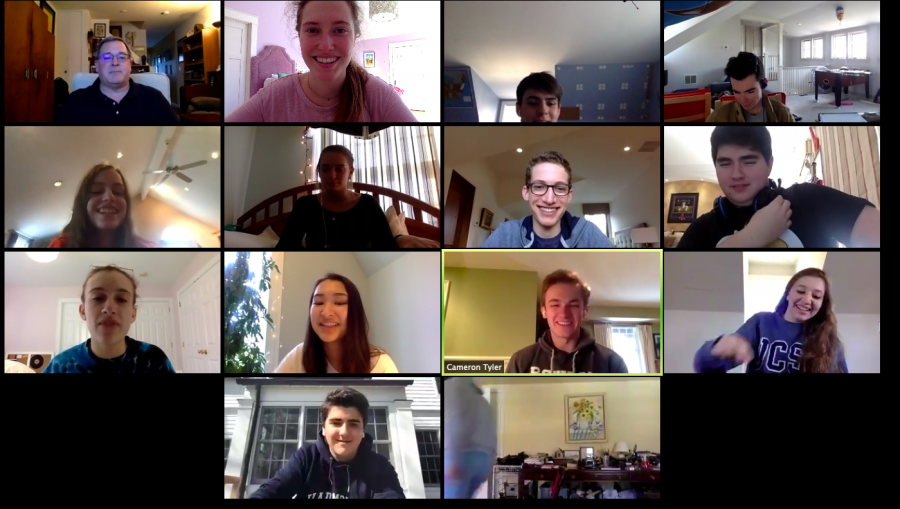The Show Must Go On(line)
Two St. Luke’s teachers adapt to the online format and find creative ways to keep the arts alive.
April 16, 2020
The motto “the show must go on” has taken on a new and deeper meaning during this time of trying to contain COVID-19. Social distancing has transformed and derailed the country and the world, pausing face-to-face interaction. One of the areas hit the hardest is the arts, which are built on live audiences’ energy and applause. St. Luke’s is no exception. Now home, St. Luke’s art students race to comprehend this unprecedented style of school taking place on zoom. Thankfully, teachers like Mr. Griffa and Mr. Lynch are finding ways to continue the arts and keep their students engaged during online learning.
Upper School choir director Mr. Griffa explained that he’s trying to find ways to teach himself the technology and software required in his choirs and create opportunities where they can sing together. “Because choir is a performance-based curriculum, our situation does not allow us to continue that in a feasible way. We have to come up with other ways.”
This is an ongoing process, as Griffa is learning along with his students what works best. Griffa and his choirs discovered that Zoom’s lag time is ineffective for rehearsals, so he has found other ways to connect his students without Zoom.
Griffa has created projects that allow students to choose from an assortment of creative music-related activities. These projects range from singing a favorite song with karaoke to composing or conducting a chosen song, allowing students to express creativity in methods that normally would not be possible if still in school.
This time is forcing people to re-think the delivery of the arts and how to enjoy them. Mr. Griffa’s main priority is that his students find ways to express themselves.
“I want my singers to find more about what their likes and dislikes are about music. The projects are a way for them to share with me,” Griffa shares. “I’m the lucky one because I get to find out another musical side of my students that I would have never known about.”
Mr. Griffa has also taken up the mantle of directing the Upper School spring play, Imaginary Invalid. Even though the play will not take place at school, he’s pushing the cast to memorize their scripts and has adjusted the schedules to rehearse with them after school via Zoom.
The major adjustment is that the spring show will be online and will be “a reading that won’t be able to be acted out because [the actors] are not all in the same space.”
26 Pebbles, the St. Luke’s Theatre Company’s show, will be performed as a movie and documentary.
For both SLS theater and choir communities, not being able to perform together and put on their shows and concerts is an insurmountable loss.
“As a music director, this is the hardest thing I’ve ever had to do because what we do is so face-to-face,” Griffa revealed. “The choir is an ensemble, it’s done as a group and to have that taken away and it only be done virtually is very painful for me. It is very hard to only see and hear through a computer what vocally is going on.”
On the bright side, Mr. Griffa has found inspiration from choir directors around the country via Facebook. The social media platform has allowed him to collaborate with fellow teachers and professionals to share creative ways to engage with music students.
On Friday, Mr. Griffa participated in an online seminar sponsored by the New York Independent School Association for Music Teachers. Mr. Griffa observed that a common theme between all music teachers is the mindset that “now we’re in this world, we need to find what works best for us.” Weekly Zoom meetings with colleagues from other independent schools strengthen the music community: “We support each other and help each other with questions we’ve got.”
Similarly, not being in person affects Art Department Chair Mr. Lynch’s teaching style.
“In my classes, it’s very difficult [with Zoom] since every student is working on different projects at their own speed,” Lynch commented.
Lynch has worked around this barrier by ordering paint supplies and shipping them to his advanced painting students’ homes.
“I gave them everything they need: pallet, paper, paintbrushes; what they’re going to do is take a picture of what they’re working on and put it in a Google Drive [folder] for me to look at and comment,” Lynch explained.
Another cool project Mr. Lynch and St. Luke’s art teachers have started and hope to grow is “an outreach to the entire St. Luke’s community by using the hashtag #sls_creates.” This is great because it allows Mr. Lynch “to find out what people are creating with all this time on their hands at home.” Lynch welcomes all submissions, whether they are a project by yourself, with your family, or even with an alumnus. Mr. Lynch encourages students to “share what you’re doing at home — maybe something you wouldn’t have normally done, such as painting or woodworking, if you didn’t have all this time.”
If you’re interested, send your latest creation to Mr. Lynch, with the hashtags #sls_creates and #sls_athome. “This is to celebrate the arts and creativity.”
Mr. Lynch feels that during this time of uncertainty and isolation, creating art provides his students with peacefulness.
“It is a nice way to direct your focus inward and requires thoughtfulness and relaxation,” Lynch reflects. “Art allows them to express and distract themselves. There’s no pressure when making art; they can just enjoy the process.”
In these trying times, Mr. Griffa’s and Mr. Lynch’s adaptation to online learning display our school’s best qualities: flexibility and resilience. St. Luke’s teachers are determined to keep our connections alive through the arts, be it music, painting, or acting. St. Luke’s has not given up: the show must go on, even if that means online.




